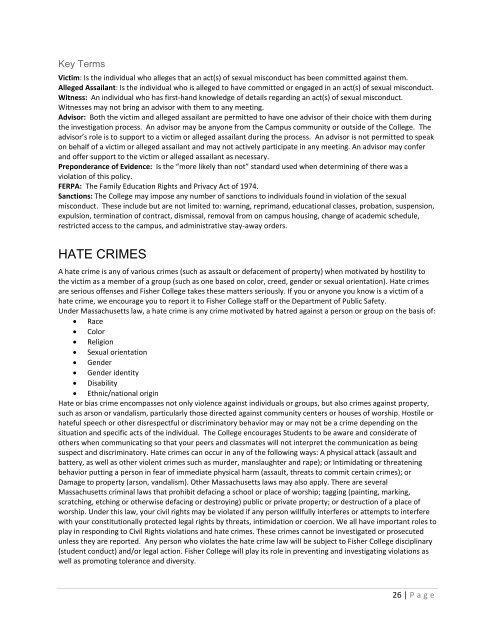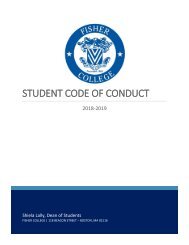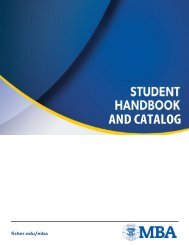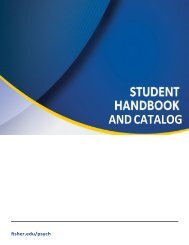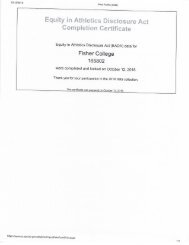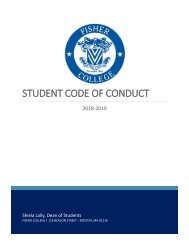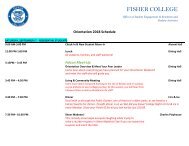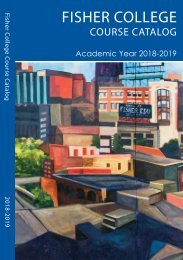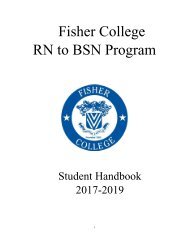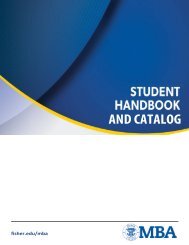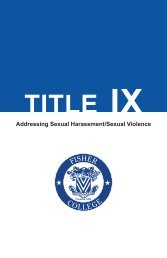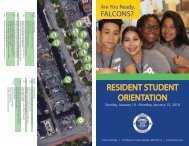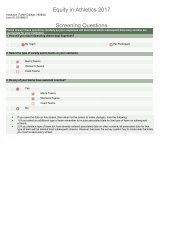Student Code of Conduct final 2018-2019_01
Create successful ePaper yourself
Turn your PDF publications into a flip-book with our unique Google optimized e-Paper software.
Key Terms<br />
Victim: Is the individual who alleges that an act(s) <strong>of</strong> sexual misconduct has been committed against them.<br />
Alleged Assailant: Is the individual who is alleged to have committed or engaged in an act(s) <strong>of</strong> sexual misconduct.<br />
Witness: An individual who has first-hand knowledge <strong>of</strong> details regarding an act(s) <strong>of</strong> sexual misconduct.<br />
Witnesses may not bring an advisor with them to any meeting.<br />
Advisor: Both the victim and alleged assailant are permitted to have one advisor <strong>of</strong> their choice with them during<br />
the investigation process. An advisor may be anyone from the Campus community or outside <strong>of</strong> the College. The<br />
advisor’s role is to support to a victim or alleged assailant during the process. An advisor is not permitted to speak<br />
on behalf <strong>of</strong> a victim or alleged assailant and may not actively participate in any meeting. An advisor may confer<br />
and <strong>of</strong>fer support to the victim or alleged assailant as necessary.<br />
Preponderance <strong>of</strong> Evidence: Is the “more likely than not” standard used when determining <strong>of</strong> there was a<br />
violation <strong>of</strong> this policy.<br />
FERPA: The Family Education Rights and Privacy Act <strong>of</strong> 1974.<br />
Sanctions: The College may impose any number <strong>of</strong> sanctions to individuals found in violation <strong>of</strong> the sexual<br />
misconduct. These include but are not limited to: warning, reprimand, educational classes, probation, suspension,<br />
expulsion, termination <strong>of</strong> contract, dismissal, removal from on campus housing, change <strong>of</strong> academic schedule,<br />
restricted access to the campus, and administrative stay-away orders.<br />
HATE CRIMES<br />
A hate crime is any <strong>of</strong> various crimes (such as assault or defacement <strong>of</strong> property) when motivated by hostility to<br />
the victim as a member <strong>of</strong> a group (such as one based on color, creed, gender or sexual orientation). Hate crimes<br />
are serious <strong>of</strong>fenses and Fisher College takes these matters seriously. If you or anyone you know is a victim <strong>of</strong> a<br />
hate crime, we encourage you to report it to Fisher College staff or the Department <strong>of</strong> Public Safety.<br />
Under Massachusetts law, a hate crime is any crime motivated by hatred against a person or group on the basis <strong>of</strong>:<br />
Race<br />
Color<br />
Religion<br />
Sexual orientation<br />
Gender<br />
Gender identity<br />
Disability<br />
Ethnic/national origin<br />
Hate or bias crime encompasses not only violence against individuals or groups, but also crimes against property,<br />
such as arson or vandalism, particularly those directed against community centers or houses <strong>of</strong> worship. Hostile or<br />
hateful speech or other disrespectful or discriminatory behavior may or may not be a crime depending on the<br />
situation and specific acts <strong>of</strong> the individual. The College encourages <strong>Student</strong>s to be aware and considerate <strong>of</strong><br />
others when communicating so that your peers and classmates will not interpret the communication as being<br />
suspect and discriminatory. Hate crimes can occur in any <strong>of</strong> the following ways: A physical attack (assault and<br />
battery, as well as other violent crimes such as murder, manslaughter and rape); or Intimidating or threatening<br />
behavior putting a person in fear <strong>of</strong> immediate physical harm (assault, threats to commit certain crimes); or<br />
Damage to property (arson, vandalism). Other Massachusetts laws may also apply. There are several<br />
Massachusetts criminal laws that prohibit defacing a school or place <strong>of</strong> worship; tagging (painting, marking,<br />
scratching, etching or otherwise defacing or destroying) public or private property; or destruction <strong>of</strong> a place <strong>of</strong><br />
worship. Under this law, your civil rights may be violated if any person willfully interferes or attempts to interfere<br />
with your constitutionally protected legal rights by threats, intimidation or coercion. We all have important roles to<br />
play in responding to Civil Rights violations and hate crimes. These crimes cannot be investigated or prosecuted<br />
unless they are reported. Any person who violates the hate crime law will be subject to Fisher College disciplinary<br />
(student conduct) and/or legal action. Fisher College will play its role in preventing and investigating violations as<br />
well as promoting tolerance and diversity.<br />
26 | P a g e


